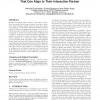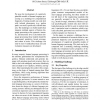16 search results - page 1 / 4 » A Computational Cognitive Model of Syntactic Priming |
COGSCI
2011
12 years 9 months ago
2011
The psycholinguistic literature has identified two syntactic adaptation effects in language production: rapidly decaying short-term priming and long-lasting adaptation. To explai...
ACL
2010
13 years 3 months ago
2010
The analysis of reading times can provide insights into the processes that underlie language comprehension, with longer reading times indicating greater cognitive load. There is e...
ATAL
2010
Springer
13 years 6 months ago
2010
Springer
Speakers in dialogue tend to adapt to each other by starting to use similar lexical items, syntactic structures, or gestures. This behaviour, called alignment, may serve important...
ACL
2010
13 years 3 months ago
2010
We pose the development of cognitively plausible models of human language processing as a challenge for computational linguistics. Existing models can only deal with isolated phen...
ACL
2010
13 years 3 months ago
2010
We report on an experiment to track complex decision points in linguistic metadata annotation where the decision behavior of annotators is observed with an eyetracking device. As ...


